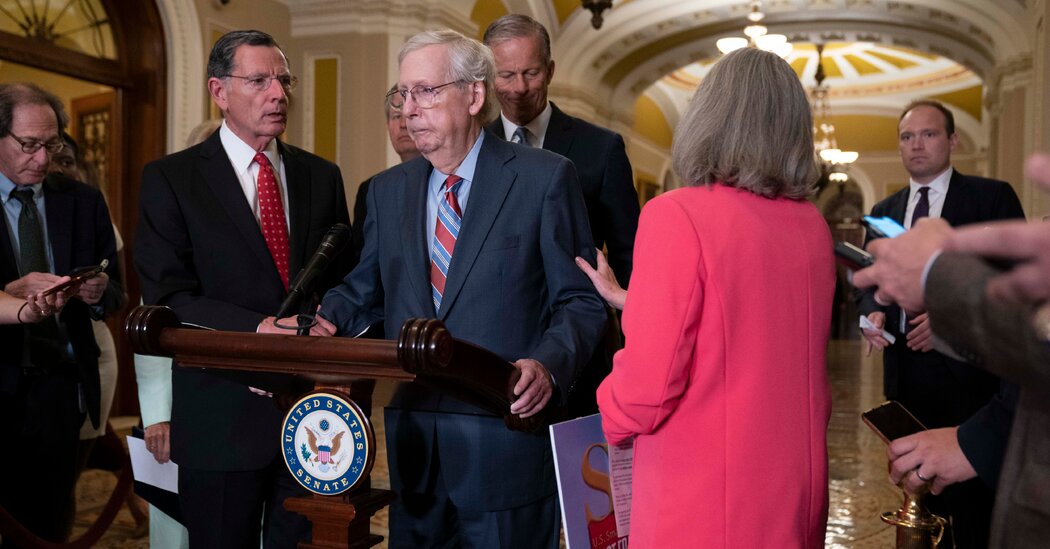Senator Mitch McConnell, the longtime Republican leader who had a serious head injury in a fall earlier this year, froze midsentence during an appeara
Senator Mitch McConnell, the longtime Republican leader who had a serious head injury in a fall earlier this year, froze midsentence during an appearance at his weekly news conference in the Capitol on Wednesday and was briefly escorted away from the microphones to recover.
In what seemed to be a medical episode, Mr. McConnell, 81, appeared to lose his train of thought when beginning his remarks on a pending Pentagon policy bill and was unable to continue speaking. Colleagues and aides waited a few awkward moments before intervening, taking the Kentucky senator by the arm and leading him away from the microphones.
“Are you good Mitch?” asked Senator Joni Ernst of Iowa, a member of the Republican leadership, as Mr. McConnell remained silent and gazed around, appearing disoriented.
Senator John Thune of South Dakota, the No. 2 Republican, quickly stepped in and picked up where Mr. McConnell had left off, followed by the rest of his leadership team.
Mr. McConnell then returned to take a number of questions from the news media — more than usual — and answered them clearly. Asked what had occurred, Mr. McConnell said only, “I’m fine,” and said he was able to continue with his leadership duties. Aides later said that he had experienced some lightheadedness but noted he was able to resume speaking within minutes. They declined to elaborate on his medical status.
The episode was just the latest reminder of the advanced age and frail condition of the top Republican in the Senate, raising questions about his future and that of his party.
Mr. McConnell, who became the longest-serving Senate leader in history at the beginning of the year, has moved more slowly and struggled with hearing loss since he took a serious fall at a Washington hotel in March during a fund-raising event, sustaining a concussion. His allies have rejected any suggestion that his abilities have declined, saying he remains in charge in private sessions. They expressed confidence again on Wednesday.
“I was concerned when he fell and hit his head a number of months ago and was hospitalized,” said Senator John Barrasso of Wyoming, the No. 3 Republican and a medical doctor, who escorted Mr. McConnell to his office on Wednesday after the minority leader fell mute. “And he has made a remarkable recovery. He’s done a great job leading our conference, and he was able to answer every question that the press asked him today. And you may note, he answered more questions than he normally does.”
Still, Mr. McConnell has appeared physically diminished since the fall, in which he also broke a rib, spent time in a rehabilitation center and was absent from the Senate for more than a month before returning. The Republican leader, who had polio as a child, has always tread carefully and avoided stairs but has been noticeably more careful since his recent injuries when moving around the Senate.
In recent days, he has sometimes been less active on the floor; it was Mr. Thune, who is widely regarded as a potential successor, who spoke for Republicans at the start of the debate last week on the annual Pentagon bill, a role usually relished by Mr. McConnell, who is keenly interested in defense policy.
Wednesday’s episode was clearly alarming to those colleagues accompanying him at what is known as the weekly stakeout following closed party lunches. It took a few moments for both members of the media and the Senate to recognize that Mr. McConnell was struggling, since he often picks his words carefully at news media events and has a penchant for remaining silent when he does not wish to respond to a question. On a few recent occasions, Mr. McConnell, who uses hearing aides, also seemed to have difficulty hearing questions being directed to him.
But on Wednesday, it was clear that something else was the matter.
“Is there anything else you want to say, or should we just go back to your office?” Mr. Barrasso asked Mr. McConnell, taking him by the arm. “Do you want to say anything else to the press?”
Mr. McConnell was re-elected to a seventh term in 2020, and he would be on the ballot again in 2026 if he chose to run. He was re-elected as party leader in November after holding off a challenge from Senator Rick Scott of Florida, who decided to oppose Mr. McConnell after overseeing a Senate campaign operation that was unable to regain the majority. Mr. McConnell had the support of an overwhelming majority of Republicans, but the challenge itself was noteworthy because Mr. McConnell had typically been named leader without a contest.
His fall and the subsequent health issues were another display of the challenges faced in an institution with an aging membership. Senator Dianne Feinstein of California, who recently turned 90, was away from the Senate for months earlier this year with a variety of health issues, and her absence temporarily slowed Democrats from confirming some contentious judicial nominees in the narrowly divided Senate.
After returning to speak to reporters on Wednesday, Mr. McConnell coherently answered questions on the prospects for the House impeaching President Biden, the criminal case of Hunter Biden and the state of the appropriations process.
One question he chose not to answer and laughed off before walking away was a query about who he would favor to replace him as leader if he stepped aside.
Kayla Guo and Luke Broadwater contributed reporting.
www.nytimes.com
